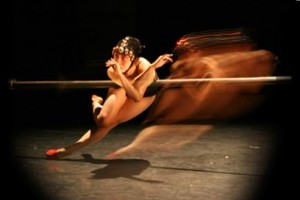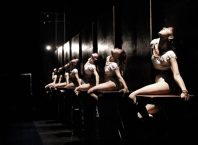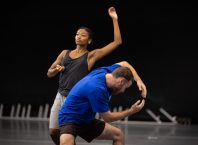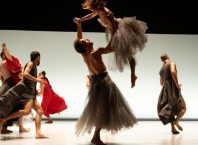“China was very still for many years, but the last 10 – 20 years have been very fast,” said Zhang Changcheng, Director of the Beijing Modern Dance Company (BMDC), “I spend half the year travelling, when I return to China, I cannot find my way home, everything changes. That’s lucky, because when you live in changing times everything is new and you can try new things.” BMDC presented two works in Israel: Unfettered Journey, choreographed by Hu Lei, and Oath (Midnight Rain) choreographed by Gao Yanjinzi. The Suzanne Dellal Centre hosted a pre-show talk with Zhang Changcheng and Creative Director Gao Yanjinzi on Friday, October 23, hosted by the centre’s director Yair Vardi.
Zhang Changcheng spoke in English, and shared his artistic vision for BMDC, the first independent company registered with the government, saying, “Artists need space to create. I tried to make a new management system, to make it easier for artists. This is my way – everything must be legal, it’s good for the artists and for the future.” As the company’s director (since 1998) his program for developing the company was guided by three principles: establishing BMDC as an independent company, creating a building for the company that would be in a central location – saying, “That is my way – I must keep in the center”, and encouraging crossover projects between artists in different fields.
Vardi was present at the opening of the BMDC Center in Beijing. Describing the company as “A great success story,” he said that the building had an interesting design and in addition to the studio includes a multi-media building, salon for meetings and restaurant. There is also a youth hostel adjacent to the building.
The center offers artists an opportunity to connect with other artists – dancers, writers, filmmakers and other visual artists, at the weekly salon meetings, and also a space in which to try out new ideas. Audiences often create a demand for a particular work or style to be repeated, but that, says Changcheng, is “boring.” He is also open to creating opportunities for emerging artists, saying, “Young people have no money, network, and no experience. People see them as small potatoes. I think, who knows, after ten years…” The Center offers young artists residency programs at the Center as a chance to develop their ideas.

Popular in China, the BMDC Center is, according to Changcheng, “a flag in China, everybody is watching us. If we can do it – they can do it.” Expanding his belief that dialogue is a good foundation for creative work to the decision making level, he has created a new structure for the dance company, replacing the traditional role of artistic director with a creative team of five senior dancers. The team thinks and plans together with a consensus required for decisions.
Describing the company’s relationship to dance and Chinese cultural tradition, Changcheng says, “My style is contemporary, but we keep the modern dance name [to make it] a little easier for audiences to understand.” He expressed his approach to the contemporary in philosophical terms, saying that the moment we experience in the present, “after today, tomorrow – it will be already part of tradition, the past. China has a long history but young people don’t always know what happened 6,000 years ago. They know McDonalds. We try to make some connection. There are lots of elements from tradition in our dance. Some elements of movement, such as T’ai Chi, are traditional, but the whole image is not traditional.”
He further discussed one of the major questions for arts managers everywhere: how to bring young audiences to the theatre. “Young people in China and everywhere,” Changcheng mimed holding an invisible gameboy in his hands and fingers dancing, continued, “play games, internet…digital, google, iphone generation – they don’t want to meet person to person. Theatre is a great thing. All of the people sitting here: same people, different thinking. Not only by language, but by emotion, we can feel each other.”
Choreographer Gao Yanjinzi spoke eloquently in both her mother tongues: dance and Chinese. Qing Fang-Bentov, a dancer originally from China who lives in Israel, translated for Yanjinzi. Asked to discuss her work, Yanjinzi, first replied: “Better to come to the theatre,” then elaborated on her artistic philosophy.
“First of all, dance is my mother tongue. Because dance is my mother tongue I would like to communicate with the audience with dance first and not words. If I use words first the dance becomes pale, no color. Because you come especially today, the communication will be meaningful. I believe that everybody will look at the performance as your own child.
Chinese traditional dance is my mother. She nurses me and teaches me how to walk and speak, but I will use my life experience [to create dance]. Modern dance doesn’t stop, doesn’t stick on one style. Whatever you touch, see, experience, is going to be your dance language. Time is now, what you are experiencing, in this moment you’re experiencing your life development, your continuation. Culture is like the earth, the dirt is very rich, but every single one will put their own seed and have their own flower. A flower, a bird – to use this as a metaphor to experience our life…through this subject we can imagine ourselves as real flower. We can exchange positions: we are man but have the heart of a woman. If you have this exchange position, how do you continue your life, how do you make the flower bloom?
In terms of the differences and influences of Chinese vs. Western dance, she said, “We are inside our experience. Dance comes from everything that influences us and we don’t always know where it comes from. Lucky we are artists, there are no borders between us and the world, culture, religion…We are open, totally, to the world. People from Western countries have lots of questions about modern dance in China – its only 10 years old.”
Asked if it was difficult to study modern dance in a country that has experienced it for only a short time, Yanjinzi responded, “To learn a body language it takes a lifetime, to learn an idea, a concept, philosophy takes a short time. Once you wake up, you wake up, you scream…”
When Yair Vardi asked Yanjinzi how long it usually took her to create a dance, she said, “Every moment I’m thinking and imagining, [while] working, sleeping…[making a dance takes] One month – making a dance is very fast. All the time the emotion is cooking, when its ready” – she concluded with a sharp sudden clap of her hands in a gesture that required no translation.





